What Is The Best Drapery Header Styles?
TLDR;
The
best drapery header style depends on your space, desired look, and functionality needs. Pinch pleat is ideal for a classic, formal feel, grommet suits casual, modern spaces, and wave fold offers a clean, minimalist look with smooth operation. At Simply Windows, we help clients choose the right header based on fabric, hardware, and room purpose.
Curtain Heading Styles Explained: Why They Matter
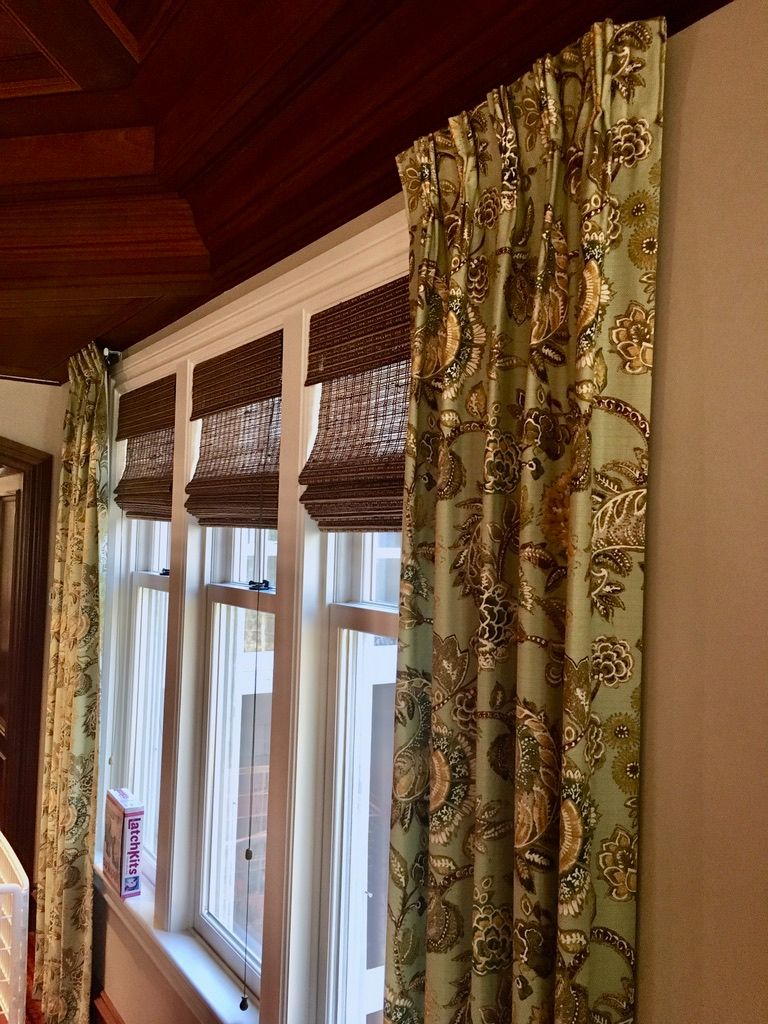
Drapery headers are more than just decorative finishing touches — they shape how curtains fall, operate, and appear. The header style affects:
- Light control and privacy
- How easily the curtains open and close
- The space curtains take when drawn back (stack-back)
- Compatibility with rods or tracks
- The overall aesthetic of your room
Choosing the right curtain top finish means balancing visual impact with practical function. From structured pleats to casual loops, the header defines your drapery’s personality and performance. At
Simply Windows, we guide homeowners and designers through these decisions to ensure the final result is beautiful and functional.
Why Drapery Header Styles Matter (Aesthetic + Practical Purposes)
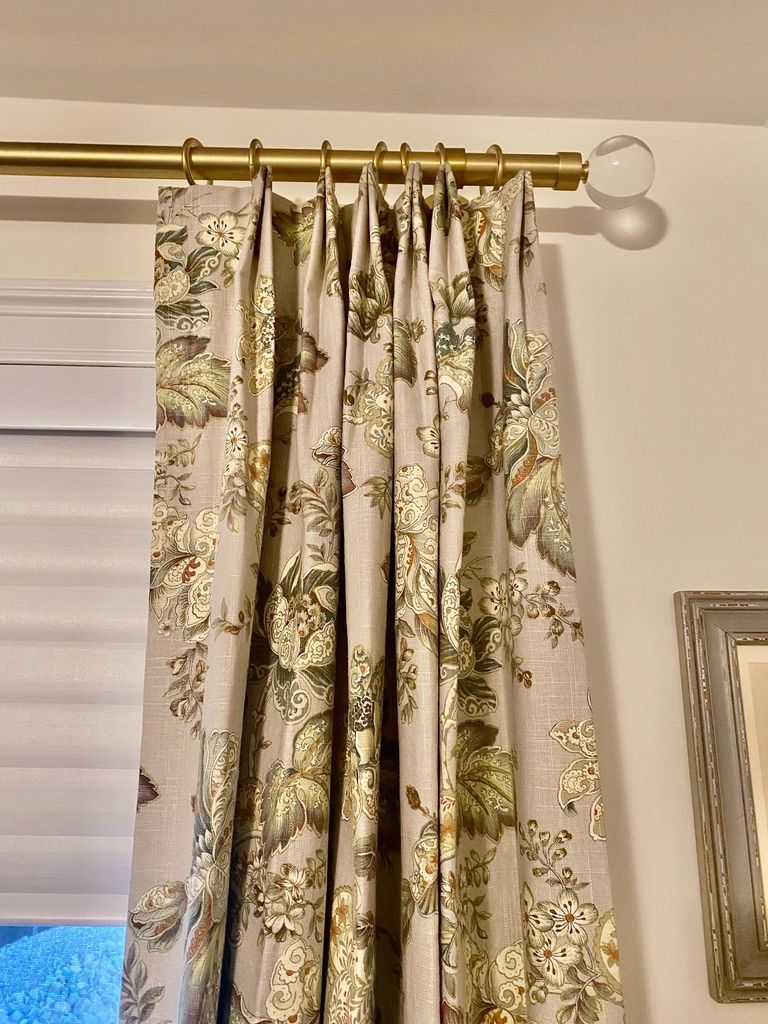
Functional Purposes:
- Light Control: Some headers create tighter folds, offering better room darkening.
- Ease of Movement: Headers like grommet and wave fold slide smoothly, ideal for frequent use.
- Stack-Back Space: Ripple fold and grommet headers reduce stack-back, leaving more light when open.
- Rod or Track Compatibility: Not all headers fit all hardware — knowing what works together avoids installation issues.
- Fullness: Certain headers demand more fabric to achieve a full, tailored look.
Aesthetic Impact:
- Curtain Pleats Meaning: The pleat or fold pattern dramatically changes how the curtain hangs.
- Visual Style: From traditional pencil pleats to modern wave folds, headers align with interior styles.
- Room Purpose: Formal dining rooms may call for pinch pleats, while rod pockets suit casual kitchens.
- Decorative Top Treatments: Goblet or box pleats can add luxury and drama.
Overview of Drapery Header Styles (Top Curtain Heading Types)
Let’s explore the most popular and practical curtain heading types available in 2025:
Pinch Pleat (Single, Double, Triple / French)
- Best for: Formal dining rooms, traditional living spaces
- Look: Tailored, elegant, timeless
- Functionality: Medium slide, moderate stack-back
- Notes:
- Triple pinch (French) pleats add more fullness and drama
- Requires hooks and works on both rods and tracks
Grommet / Eyelet
- Best for: Casual settings, contemporary interiors
- Look: Sleek, modern, clean
- Functionality: High glide ease, low stack-back
- Notes:
- Metal rings inserted into the fabric top
- Slides directly over rods, no extra hardware needed
Wave Fold / Ripple Fold
- Best for: Minimalist designs, offices, open layouts
- Look: Smooth, undulating folds
- Functionality: Excellent sliding, very low stack-back
- Notes:
- Requires a specific track system
- Popular in designer homes and luxury condos
Rod Pocket
- Best for: Kitchens, bathrooms, budget-conscious rooms
- Look: Soft gathers, informal
- Functionality: Poor glide, best left stationary
- Notes:
- No visible hardware
- Not ideal for frequent use
Tab Top & Back Tab
- Best for: Boho, eclectic, or rustic interiors
- Look: Casual, decorative loops
- Functionality: Low to medium glide ease
- Notes:
- Back tabs hide the rod for a cleaner look
- Works well with medium-weight fabrics
Pencil Pleat
- Best for: Traditional interiors, multipurpose rooms
- Look: Fine, tight folds
- Functionality: Adjustable, decent stacking
- Notes:
- Requires curtain tape and cords
- Highly flexible for fullness adjustment
Inverted Pleat / Box Pleat
- Best for: Offices, modern spaces
- Look: Structured, clean lines
- Functionality: Moderate glide, medium stack-back
- Notes:
- Inverted pleats sit behind for a flat front
- Ideal for heavy or lined drapery
Goblet Pleat
- Best for: Grand spaces, formal interiors
- Look: Decorative, full-bodied
- Functionality: Stationary or low-use settings
- Notes:
- Requires lining and interlining to maintain shape
- Very fabric-intensive
Drapery Header Style Comparison Table (Visual + Functional)
| Header Style | Best For | Look & Feel | Slide Ease | Stackback | Compatible With |
|---|---|---|---|---|---|
| Pinch Pleat | Formal spaces | Elegant, tailored | Medium | Moderate | Rods / Tracks |
| Grommet | Bedrooms, casual rooms | Sleek, modern | High | Low | Rods only |
| Wave Fold | Offices, modern living | Minimalist, clean | High | Very Low | Tracks only |
| Rod Pocket | Kitchens, tight budgets | Soft, casual | Low | Moderate | Rods only |
| Goblet Pleat | Luxury settings | Rich, formal | Low | High | Rods / Tracks |
| Back Tab | Transitional interiors | Neat, soft top | Medium | Moderate | Rods only |
| Pencil Pleat | All-purpose | Classic, versatile | Medium | Medium | Rods / Tracks |
| Box Pleat | Professional interiors | Structured, neat | Medium | Moderate | Rods / Tracks |
Best Drapery Header Styles by Room Type
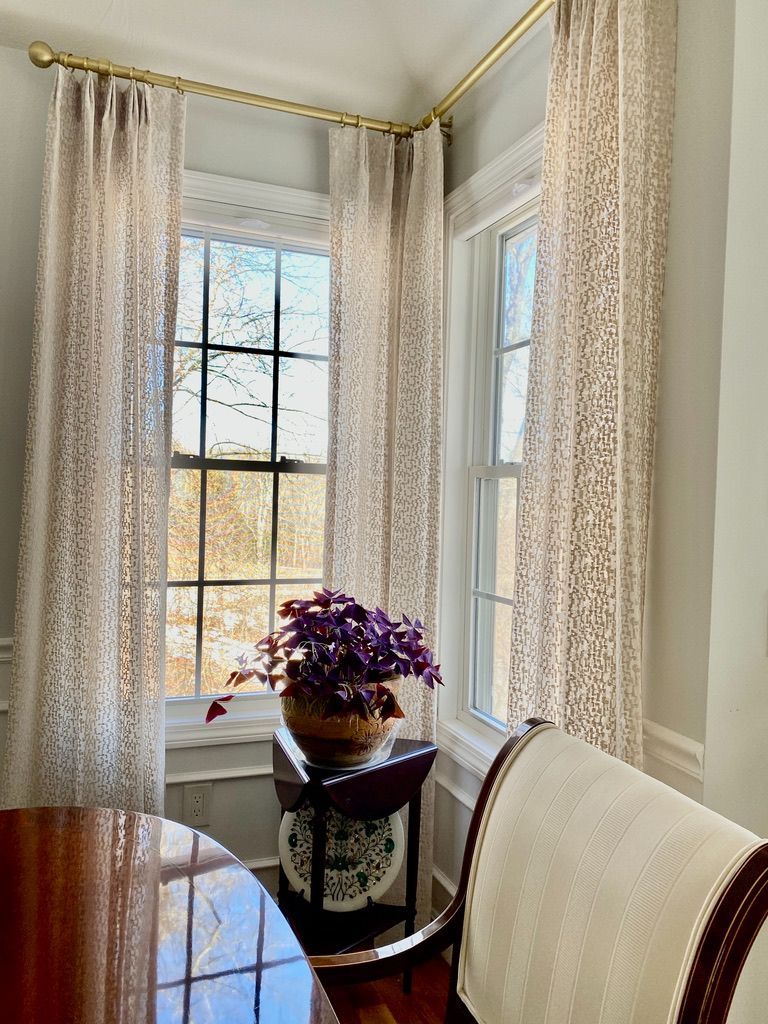
Living Room Drapery Headers
- Ideal Choices: Pinch pleat, goblet pleat, box pleat
- Why:
- Create a dramatic, decorative effect
- Pair well with heavier drapery and formal furniture
- Add visual height and texture
Bedroom Drapery Headers
- Ideal Choices: Grommet, wave fold, pencil pleat
- Why:
- Compatible with blackout lining
- Smooth operation is key for daily use
- Offers privacy without bulk
Kitchen & Bathroom Drapery Headers
- Ideal Choices: Rod pocket, tab top
- Why:
- Simple and casual
- Easy to clean and replace
- Lightweight fabric use is ideal in humid areas
Office or Study
- Ideal Choices: Wave fold, inverted pleat
- Why:
- Sleek and tailored for a professional finish
- Minimal stacking keeps window space open
- Works well with tracks and structured fabric
Pairing Drapery Header Styles with Fabric & Hardware
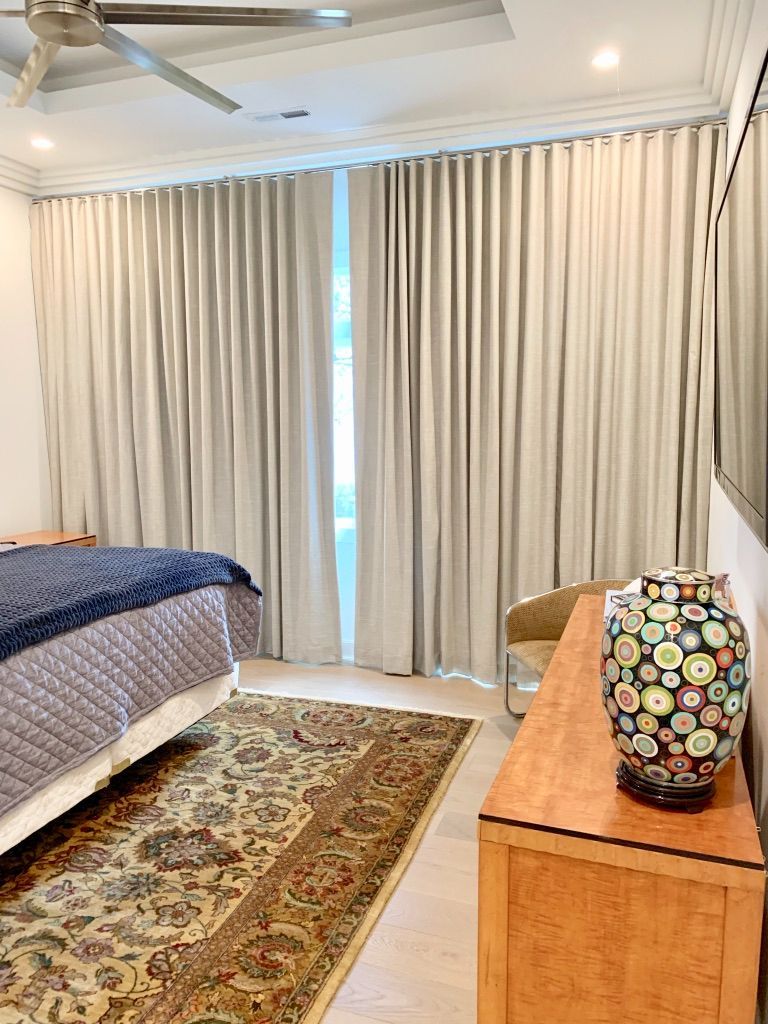
Fabric Compatibility
- Heavy Fabrics: Pinch pleat, goblet pleat, box pleat
- Light to Medium Fabrics: Grommet, wave fold, pencil pleat
- Sheers or Linens: Rod pocket, tab top, wave fold
Hardware Matching
- Rod Use:
- Works best with: grommet, rod pocket, tab top
- Track Use:
- Ideal for: wave fold, pinch pleat, inverted pleat
- Rings & Hooks:
- Required for: pinch pleats, goblet, pencil pleat
- Optional for: tab tops, back tabs
Drapery Fullness & Measuring Guide
Fullness by Header Style
| Header Style | Recommended Fullness Multiplier |
|---|---|
| Pinch Pleat | 2x – 2.5x |
| Grommet | 1.5x |
| Wave Fold | 2x (but compact stackback) |
| Rod Pocket | 1.5x – 2x |
| Pencil Pleat | 2x (adjustable via tape) |
| Goblet Pleat | 2.5x |
Tips:
- Use a curtain fabric calculator for accuracy
- Consider header tape to shape pleats consistently
- Balance fabric fullness with ceiling height and window width
- Don’t forget to determine your drapery panel count based on window width and stack-back needs to ensure complete coverage and a balanced appearance
Style Trends for Drapery Headers in 2025
- Wave Fold Dominance: Preferred in open-plan homes and minimal interiors
- Layered Sheers with Pencil Pleats: Elegant layering for softness
- Neutral and Earth-Tone Palettes: Match any pleat style
- Invisible Tracks with Ripplefold: Seamless, wall-to-wall coverage
- Statement Hardware for Grommet & Tab Top: Blending form and function
Comparison: Custom vs Ready-Made Drapery Headers
Custom Drapery
- Benefits:
- Tailored fit, fabric, and pleat style
- Better construction and lining options
- Drawbacks:
- More expensive
- Longer lead times
Ready-Made Curtains
- Benefits:
- Affordable and available quickly
- Wide range of styles (especially grommet, rod pocket, pencil pleat)
- Drawbacks:
- Limited sizing
- May lack durability or ideal fullness
Frequently Asked Questions
What curtain header style is best for blackout curtains?
Pinch pleat, wave fold, or pencil pleat work well with blackout lining due to their structured folds.
Can I use goblet pleats with sheer fabric?
It’s not recommended. Goblet pleats need a heavier or lined fabric to hold shape.
Are wave fold curtains good for sliding doors?
Yes. They glide smoothly and stack minimally, making them perfect for large openings.
What is the difference between tab top and back tab?
Tab tops show the loops on the rod; back tabs hide them, creating a cleaner look.
How do I make pinch pleat curtains look fuller?
Use 2x to 2.5x fabric width and interlining for added body and luxury.
How to Choose the Best Drapery Header for Your Space
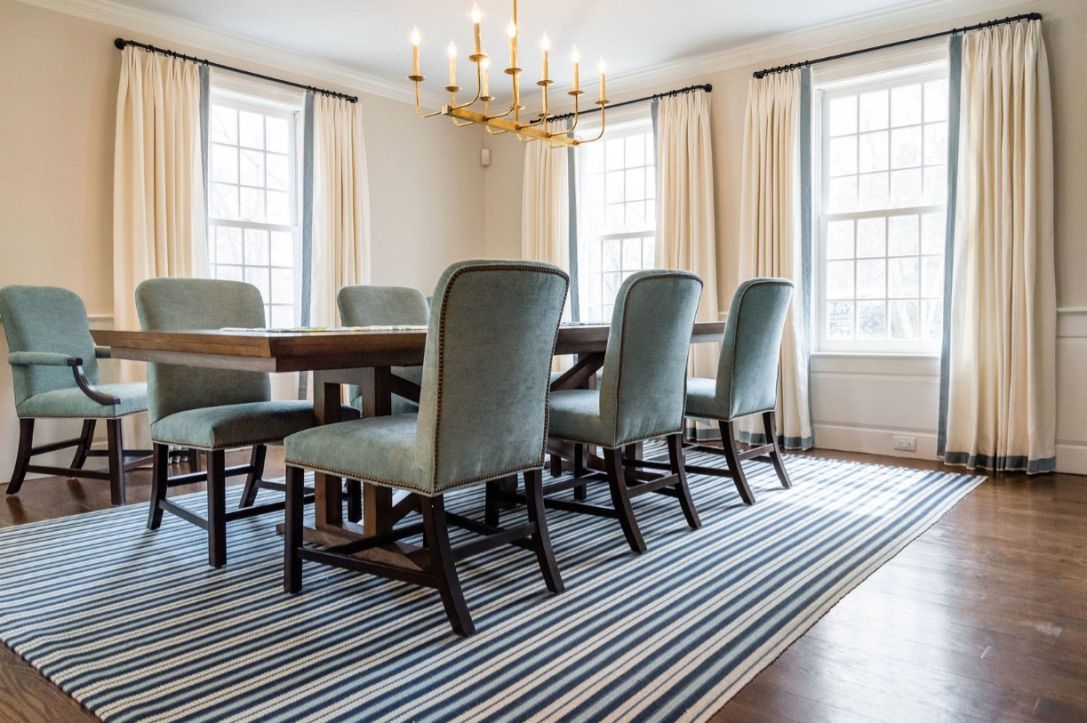
Not sure what header works best? Follow this quick flow:
- Is your space formal or casual?
- Formal: Try pinch, goblet, or box pleats
- Casual: Go with grommet, tab top, or rod pocket
- Do you need easy glide?
- Yes: Wave fold or grommet
- No: Pencil or rod pocket
- Is light control a top priority?
- Yes: Use pleated headers with blackout lining
- No: Sheer fabric and looser folds are fine
- What's your hardware setup?
- Rod: Grommet, tab top, rod pocket
- Track: Wave, pinch, box pleat
At Simply Windows, we specialize in custom drapery design — from choosing the right header style to installation and hardware matching. Need expert help? Reach out to our team today and let’s dress your windows perfectly.

